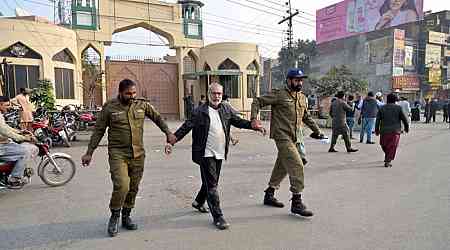
If you are the kind of person who overreacts and rushes in, I get it. You might think you can bypass the pain of what you are experiencing by getting super-proactive and taking control.
I used to overreact, but the problem was it never seemed to help. Instead, it always made things worse because it brought about more drama, stress, confusion, and chaos. Overreacting felt like experiencing the same thing twice: once when it happened, and again when I brought all my outrage to the situation. My heart felt double the weight of any circumstance.
[time-brightcove not-tgx=”true”]When we overreact our desire to quickly find a solution leads us to rush and make assumptions about what’s going on. When it comes to important social issues like a shift in political power, climate change, gun control, or other things that are mostly out of your control, you can be less bothered there, too.
To be clear, I’m not saying there isn’t plenty to be outraged about in the world. I am also not for a moment suggesting you turn your back on important issues. I’m saying that overreacting is not where our power lies. Rather it exists potentially in underreacting.
Read More: Why Being Sensitive Is a Strength
How you care about issues that move you is what counts. Sometimes your lack of peace is a false economy. Recognize that your stress and anger isn’t changing anything around you; it’s only changing things within you. As you get angrier, more worried, more agitated, you become bothered. If you are always bothered, you are always angry, which will lead to you being stressed out and eventually getting sick, exhausted, and overwhelmed. And at that point of total burnout, you can’t make even a little difference anymore.
The reality is that you don’t have to be completely outraged and reactive to make a difference. In some cases, it can take that spark of outrage for you to realize how much you care and move into action. But once you do, put your hands on your heart or take deep breaths, get off social media or go for a walk (or all of the above), and remember the impact you can make without giving up all of your peace. The art of underreacting is to move from outrage to making a real difference while still taking care of ourselves.
Simply becoming aware of how vital our peace is to feeling good makes it easier to prioritize it.. When we aren’t aware, it’s harder to be gentle: We spend all our energy trying to change others or being unwilling to accept something that is happening (even though it’s happening whether we overreact or not). Underreacting isn’t a sign of support for something you don’t support. It’s not faking your feelings. It’s how you move through something more gently. It’s how you decide how you want to respond. It’s how you protect and nourish yourself.
Let’s look at some practical ways making this shift from losing it to calmly taking action can be beneficial in your life:
Daily meditation and mindfulness
One of the best results is that I’ve learned how to gently let go of my thoughts because I do it repeatedly while meditating. When a thought comes in, I decide if I’m going to take hold of it and beat it into sub-mission or just let it go. I’ve been able to take that into my day-to-day thoughts, too. There are other mindfulness practices that don’t involve meditation but can be just as helpful, like mindful breathing, or going for a walk during which you take in every sensory detail you can. You don’t have to meditate to be mindful and practice underreacting.
Ask yourself, “Do I care about this?”
Ask yourself the question and if you don’t care, don’t bother with it. You can get your mind involved in just about anything, but if you notice the thought and decide you simply don’t care, it’s easier to let it slip away. If you aren’t sure, ask, “Why should I care about this?” or “Do I actually have the space and time to care about this?”
Distract yourself
If you can’t let it go and you keep ruminating, get on to something else. Listen to a podcast about a very unrelated topic, do a crossword puzzle, bake something, or learn how to tap-dance. Do anything that moves you from overthinking to underreacting.
Notice what else is going on when you typically overreact
Do you overreact out of habit or because you are one of the following: hungry, hurt, tired, drunk, overwhelmed, sick or worried.
Those things are going to lower your ability to underreact. Take care of yourself so you experience those things less or not at all. I have a rule (when I have the choice) not to engage in difficult conversations or situations where I may overreact because I am hungry, tired, or stressed. As the saying goes, please forgive me for the things I said when I was hungry. Knowing how these factors affect me, I have more grace and compassion for people who say silly things because I know they might just need a sandwich. That said, I won’t be mistreated because they can’t self-regulate. Neither should you.
Write about it
This is why I journal. I’m not trying to capture memories, but instead I want to move the thoughts spinning around inside of me onto a sheet of paper where they can sit quietly. Seeing my fears and insecurities and private rages on paper defuses them and makes them easier to let go of. I can more clearly see what needs my attention and what is not worth fighting today or any day.
Walk first
When you can’t decide how you want to react, or when you think someone needs a piece of your mind, promise yourself to take a walk first. If taking a walk isn’t accessible to you, think about other ways of moving your body, not to work out in a fitness way but to move around and work out the things you are unsure about.
Something will come along that unnerves you—something that has you lose your ever-loving peace. You won’t be able to collect yourself until you notice that it’s time to protect your peace. The good news is that once you notice, you are usually only one or one hundred deep breaths away from reclaiming your peace. Remember, being gentle isn’t pretending that things are perfect or ignoring pain in ourselves or in the world. It’s simply moving through with more attention, compassion, and hope.
If it’s not time to take a bigger step, consider one tiny step. Practice pausing. A five-minute pause can be the difference between you overreacting and underreacting. Take a time-out by simply waiting to respond or by saying, “I need time to think about this, let’s pause the conversation/debate/meeting.” This is especially helpful if something comes up and you feel flooded with emotions. It’s ok to take a little time.
It’s also ok not to be ok. Sometimes the pause that you need may be screaming into your pillow or crying to friends. Underreacting isn’t about maintaining perfect composure for those around you. It’s about taking care of yourself and limiting harm in times of turmoil.
Adapted from GENTLE by Courtney Carver. Copyright © 2025 by Courtney Carver. Used by permission of Balance, an imprint of Grand Central Publishing, a division of Hachette Book Group, Inc., New York. All rights reserved. No part of this excerpt may be reproduced or reprinted without permission in writing from the publisher.





























